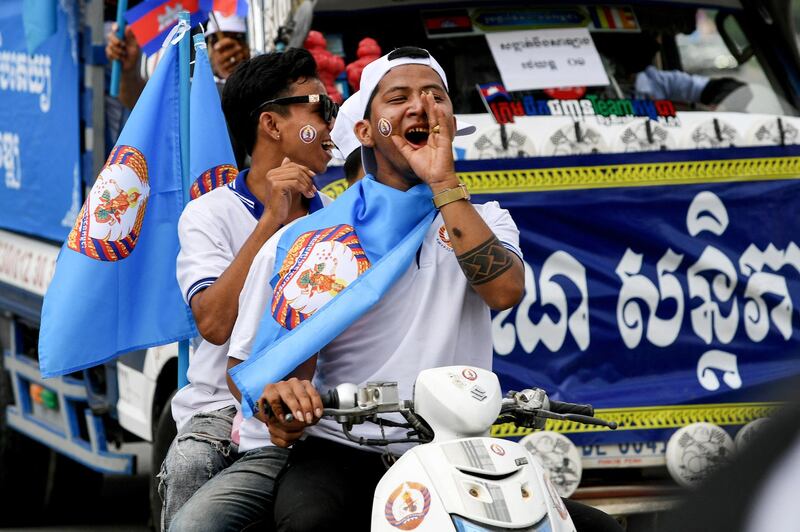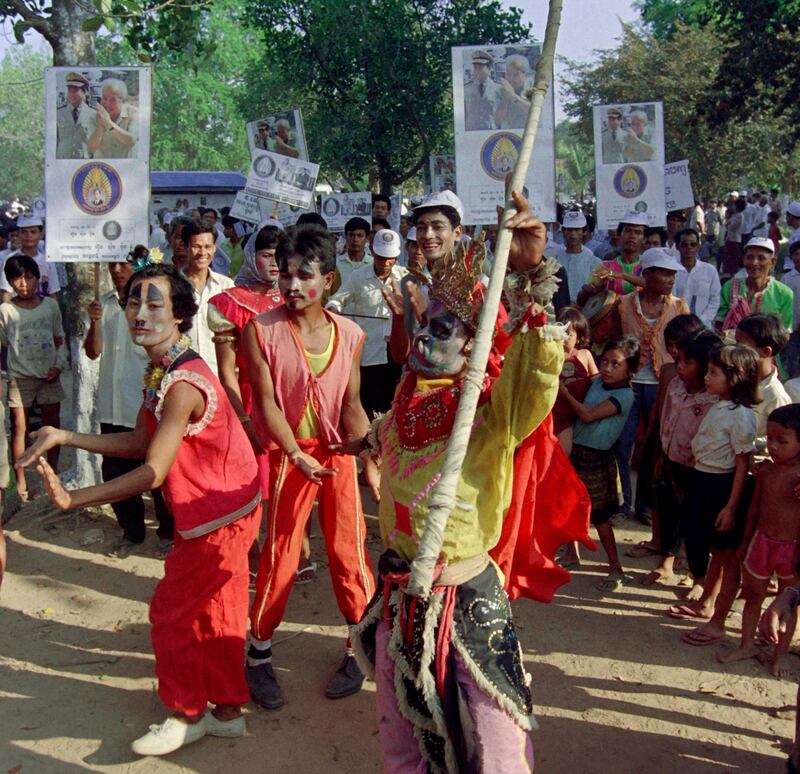There's still three months until Cambodia's general election but it's safe to assume that the Candlelight Party, the main opposition party, will be disappointed. If it wins a handful of seats in the National Assembly that would be quite an achievement, as would getting to July without being forcibly dissolved.
The Cambodian People's Party (CPP), in power since 1979, will win most, if not all, seats in parliament, as it did at the last general election. And there's ever more reason for it to tighten its chokehold on politics as it undergoes a once-in-a-lifetime transfer of power. Prime Minister Hun Sen is engaged in a dynastic succession to his eldest son, the military chief Hun Manet, after almost four decades in charge.
No opposition party will be allowed to even lift its head until that succession process is secure, possibly years after Hun Manet becomes prime minister. His rule will be precarious in its early stages and Hun Sen (who'll take a "mentoring role" while remaining CPP president after resigning as prime minister) will intervene at the first sign of trouble. That means any challenge from the opposition will have to wait until at least the 2028 general election.
The opposition shouldn’t waste this moment for reflection and renewal. It could consider its own generational succession. Most opposition grandees are of Hun Sen’s generation: the exiled Sam Rainsy is 74; the detained Kem Sokha is 69. Most important, though, the opposition needs to recover its base.

The biggest anti-CPP electoral successes came in 1993, when the royalist Funcinpec actually beat the CPP, and in 2013, when the now-banned Cambodia National Rescue Party (CNRP) finished just 4.4 percentage points behind the ruling party. But both achievements came after many years in the wilderness. For most Funcinpec officials in 1993, that meant physical exile during the socialist People's Republic of Kampuchea-era in the 1980s. For the CNRP in 2013, it meant after a woeful performance in 2008, the slow unification of opposition parties, and, again, personal exile.
Yet, those periods of weakness allowed both parties to build a genuine movement and coherent base. When Funcinpec won the 1993 election (the first democratic ballot in decades, if not ever, in Cambodia) it had solid support from royalists, non-communists, professionals, and returnees. For the CNRP in 2013, it was trade unions, the newly-emerging urban working classes (mostly garment workers), urban liberals, disaffected professionals, and the diaspora.
Decimated civil society
But with Funcinpec’s collapse as an electoral force by the early 2000s, many royalists ended up with the CPP, as did many professionals. For the CNRP, which was forcibly dissolved in 2017, the treatment was slightly different. After almost losing the 2013 general election, the ruling CPP did something different: attacking its opponent’s base and co-opting swathes of it.
The trade union movement and much of civil society has been decimated. The CNRP’s activist core has been harassed, jailed or forced into exile. At the same time, though, the CPP massively increased the minimum wage for garment workers from $80 per month in 2013 to around $200 today, although most of the credit for that should go to the workers and unions.
There is now a social welfare system and cash transfers to the poor that wasn't even imaginable in 2013. The government bureaucracy was opened up (partly) to competent officials who lacked the patronage that typically decided promotions. Hun Manet, the future prime minister, has done much work (and allegedly spent a lot of money) on wooing the diaspora.
Yet, the opposition hasn't psychologically moved on from 2017. There were hopes that Sam Rainsy would return to Cambodia in 2019 to potentially lead a groundswell of discontent (or, at least, renew the opposition's morale). Some still think Kem Sokha, the CNRP leader detained for treason, will be freed or pardoned, and return as head of a party. Now the opposition movement is stuck, hoping for a status quo ante that really isn't coming back.

There must also be a recognition that it has to rebuild, root and branch, back into a movement with a new base – not a hierarchical political party. As was in the case in the past, that base will largely be determined by those who don’t feel represented by the ruling party, especially now it undergoes a challenging leadership succession that will throw up new contradictions and grievances.
Anti-corruption will likely be a key issue. Hun Sen has convinced other CPP elites to accept his dynastic succession on the promise that all their children and younger relatives will also rise through the ranks. That's gathering pace right now. But ever-greater corruption will follow, as the Hun family knows.
Many of the previously-unionized garment workers remain loyal, as do swathes of the diaspora, which are the primary donors for opposition circles. But an opposition movement needs to win over the professional middle-classes, too, the sort that are up to their eyeballs in debt. Environmentalism could be a key pillar.
Policy agenda and expertise
Most important is a positive agenda, not simply being the anti-CPP vote. It will have to shed the anti-Vietnamese hatred that has dominated opposition politics for decades. It'll also have to be more savvy in talking about China. It's not good enough to claim that Cambodia is Beijing's "colony." No serious thinking person reckons Cambodia can break away its dealings with China, and certainly not as forcefully as some in the opposition appear to think.
What a new opposition movement needs to do is to become more serious. Any opposition party implicitly asks the Cambodian people to take a massive leap of faith in not re-electing a party that has been in power since 1979, and which claims (debatably) to have been integral in securing peace and relative prosperity.
![Cambodian army chief Hun Manet [center], son of Cambodian Prime Minister Hun Sen, attends a ceremony of the Royal Cambodian Armed Forces at the Defense Ministry in Phnom Penh, Cambodia, Thursday, April 20, 2023. Hun Manet, who is widely expected to replace his father, Hun Sen, as the country's prime minister later this year, was promoted on Thursday to his country's highest military rank. Credit: Associated Press](https://www.rfa.org/resizer/v2/WI224W5AA6RX7BKEIIYQTOJSUE.jpg?auth=1c647e7914502ddc6f26c0fc4cc3ccc844a1095266f32626e98ed3a67d3c0c88&width=800&height=533)
But for too long opposition parties (and that includes the Candlelight Party) provided pledges, not manifestoes, and led many to believe (not unjustifiably) that they would decide on an actual program once they won power. No shadow cabinet; no announcement of which politicians would become which minister and why; no indication that their candidates are more experienced or talented than the CPP’s ministers.
A renewed opposition movement has to rival the government on expertise. The transition to a Hun Manet government is the turning of a chapter to a younger generation that, the ruling party says, is the best and brightest, which will claim its legitimacy from good governance. Whatever the reality of that, a renewed opposition movement must also make competency and public trust core to its message. That may take some time, something it will have.
David Hutt is a journalist and analyst. He is a research fellow at the Central European Institute of Asian Studies (CEIAS), the Southeast Asia Columnist at the Diplomat, and a correspondent for Asia Times. He was based in Cambodia between 2014-2019. The views expressed here are his own and do not reflect the position of RFA.
